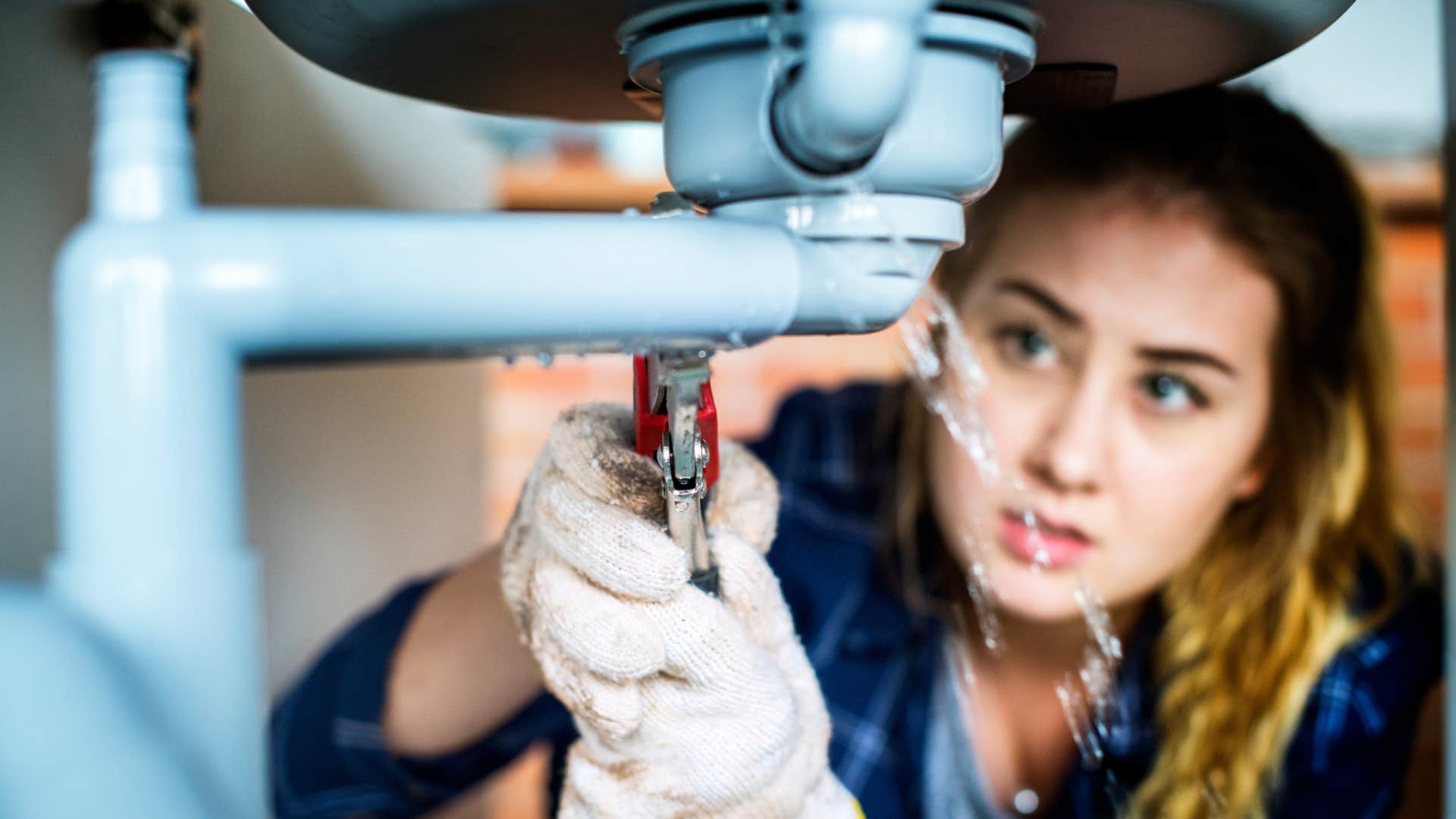11 Clever And Quiet Things Frugal People Always Do Without Talking About It
They cut costs and stretch every dollar by any means necessary.
 GaudiLab | Shutterstock
GaudiLab | Shutterstock Being frugal means developing certain habits that save money. Saving resources without making a fuss or drawing attention to yourself is the first lesson in true frugality, and there are some pretty clever and quiet things frugal people always do without talking about it, all as a way to maintain financial stability and reduce waste. From tracking every single dollar to shopping for deals, there are many savvy ways they do this.
What sets frugal people apart isn't just what they do, but how they do it discreetly. They save money and invest secretly without telling others. So, whether you're looking for ways to improve your financial mindset or are simply curious about how frugality works, these insights offer valuable inspiration.
Here are 11 clever and quiet things frugal people always do without talking about it
1. Tracking every dollar
![]() Soloviova Liudmyla | Shutterstock
Soloviova Liudmyla | Shutterstock
Frugal people will track every dollar they've ever spent without telling other people about it. According to a survey from the Penny Hoarder, 59% of Americans view themselves as savers while 41% say they are spenders. Interestingly, about one in four say they've hidden a purchase from a significant other in fear of how they would react.
So, even when money is tight, emotional and psychological factors play a huge role in how we manage our spending, and these money-saving habits help them to avoid financial drift. It's also not uncommon for frugal people to collect receipts from shopping trips and keep them in a shoe box to look back on.
Those who are organized even go as far as to separate them into categories to track what they spend on groceries, takeout, and other expenses. After all, keeping a close eye on your budget will help prevent surprises and keep those habits in check.
2. Buying generic or store brand items
 Mallika Home Studio | Shutterstock
Mallika Home Studio | Shutterstock
If you grew up in a frugal household, generic brands are the same as name brand ones, even if you argued with your parents about them tasting different. Many store brand items are produced by the same manufacturers as their name brand counterparts, with the only difference being in the packaging.
Buying those generic brands is one of the clever and quiet things frugal people always do without talking about it, choosing not to announce it because they don't feel the need to explain their purchase choices. As long as they're saving money, it's all good.
Buying generic or store brands can actually save you more money as their products tend to be cheaper. Research from CNET found that consumers can save an average of 40% on buying store brands rather than name brands. This clever way of saving helps avoid the trap of emotional spending and is more cost efficient.
3. Waiting before buying
 TetianaKtv | Shutterstock
TetianaKtv | Shutterstock
Sometimes, when we really want something we are quick to impulsively buy it, even if it's not a necessity. It takes strong self-discipline to pull yourself back from making a hefty purchase that could break the bank, especially when you could have used that money for something else.
According to a study commissioned by YNAB and conducted by the Harris Poll, 64% of spenders have regretted purchase decisions they've made impulsively. But for frugal people, they choose to wait before spending big.
Give yourself a day or two to think about it before you make a purchase. Look into the product and check out every review before you buy it. Sooner or later, you will start to see that the cons outweigh the pros, and a similar product that you already have might still be a better option.
4. Using the library as a resource
 Olena Yakobchuk | Shutterstock
Olena Yakobchuk | Shutterstock
Using the library is something most people were taught as children when their parents would take them. Libraries play such an important role in our youth, whether it's at school or for leisure. But we sometimes forget to utilize them.
While other people are okay with paying for books locally, they quietly enjoy a wealth of resources at zero cost. Some may find it strange to read something for free, but it just goes to show how much stock people put in wealth and ownership rather than intellectual growth.
Just because someone doesn't own a specific thing doesn't mean they shouldn't benefit from the knowledge it contains. Many have even gone as far as to ban certain titles that teach deeper things. But all of this is to say that frugal people have the right idea when it comes to reading for free rather than putting a price tag on it.
5. Fixing things themselves
 Rawpixel.com | Shutterstock
Rawpixel.com | Shutterstock
Another of the very clever and quiet things frugal people always do without talking about it is fixing things up around their home without hiring a professional. They see it as practical and resourceful to do and, according to a study from Loughborough University, people with frugal traits are more inclined to repair items rather than replace them.
These handy traits are extremely unique to have, especially if they are good at repairing things. And if they don't know, they learn through trial and error or through quick tutorials. After all, we can't fault anyone for wanting to learn or be better at something.
What makes this habit so clever is its long-term impact. Frugal people begin to develop skills that they and others can rely on for years to come. They can even use these skills to make even more money down the line should they choose to go into that line of work.
6. Meal prepping
 PeopleImages.com - Yuri A | Shutterstock
PeopleImages.com - Yuri A | Shutterstock
Frugal people meal prep by cooking enormous amounts of food so they can eat it for multiple meals, saving a lot of money in the process. We've all been in the position where we eat everything in the house and suddenly have to either cook at the last minute, eat out, or make another shopping trip. This is especially true with kids and teenagers who consume a lot of food within the home.
There's nothing wrong with parents teaching their children about meal prepping at an early age. This will not only teach them self-discipline, but will instill gratitude for the food that they eat. And it makes it a fun activity for the whole family.
7. Buying used goods
 GaudiLab | Shutterstock
GaudiLab | Shutterstock
Knowing the value of things doesn't mean you have to pay astronomical amounts of money for them. For instance, when you need to buy an item, there is always an alternative store that likely carries that same item but is used. Many of these secondhand items are just as good and work the same.
Frugal people utilize secondhand products from thrift stores and flea markets to get the feel of the original experience with a smaller price tag. You could shop online for a record and books or you can go to the flea market to get used goods that are just as good if not better for half the cost.
These secondhand stores are slowly becoming popular again, with younger generations leading the shift. According to Capital One shopping research, 83% of Gen Z consumers have purchased or are interested in secondhand apparel and 64% search for items secondhand before buying new.
8. Using their rewards from loyalty programs
 Ground Picture | Shutterstock
Ground Picture | Shutterstock
Loyalty and rewards programs encourage consumers to allocate more of their budget to brands who offer these rewards to them. According to a survey by DealAid, 75% of consumers prefer a brand with rewards loyalty programs than ones without one, and 43% of them spend more money when they are actively enrolled in a loyalty rewards program.
Without drawing too much attention, signing up and using rewards programs is one of the clever and quiet things frugal people always do without talking about it. Over time, the points they accumulate transfer into discounts or even in-store rewards like tote bags and mini products.
It's every frugal person's dream to have rewards on top of promotional events and discounts. And it's also an incentive for companies to retain loyal customers who keep coming back for more.
9. Optimizing utilities
 Halfpoint | Shutterstock
Halfpoint | Shutterstock
When you optimize your utilities, meaning you only use them when the company deems it the cheapest time for consumption, you will start to realize that it's a game. Companies will charge more for power and water usage during the day than at night.
Additionally, utilizing smart thermostats can result in significant energy savings. According to the U.S. Department of Energy, adjusting your thermostat by 7 to 10 degrees Fahrenheit for eight hours a day can save you approximately 10% annually on heating and cooling costs.
This is why frugal people run things like dishwashers and washing machines during off-peak hours to reduce their energy bills. What could be considered micro-managing is just them trying to conserve their own resources, along with unplugging things when they aren't using them.
10. Negotiating bills and rates
 Prostock-studio | Shutterstock
Prostock-studio | Shutterstock
What separates frugal people from people who have no concept of spending is that they are willing to go the extra mile, even if they have to call up a company to haggle a price. According to a survey by Consumer Reports, 70% of people who attempted to negotiate lower prices on services like cable TV, internet, or home phone plans were successful in obtaining reduction or additional perks
To gain extra bonuses on top of your bill being lowered isn't being cheap, but it's being smart and clever. These savvy savers keep track of when their contracts expire and when their promotional rates end just to be prepared when they begin to renegotiate. It's a strategy that requires little fanfare but yields steady savings.
11. Practicing 'stealth wealth'
 PeopleImages.com - Yuri A | Shutterstock
PeopleImages.com - Yuri A | Shutterstock
The biggest achievement that frugal people can accomplish is to practice "stealth wealth" to keep their spending habits hidden from others. They may secretly put money into a trust or savings account and even go as far as to invest it. It might seem counterintuitive for frugal people to invest their money, but they do it a lot more than you think.
They may not openly share it with others, but many invest in bonds and cryptocurrency. When they do see financial wins, they may not even vocalize it to anyone. But by doing it quietly, they prove that a person's financial situation should always be a private affair.
Sylvia Ojeda is an author with a decade of experience writing novels and screenplays. She covers self-help, relationships, culture, and human interest topics.

